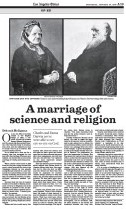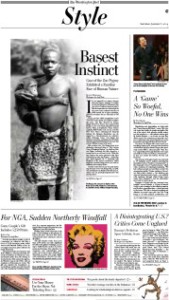 Charles and Emma Darwin never were able to see eye-to-eye on God
Charles and Emma Darwin never were able to see eye-to-eye on God
by Deborah Heiligman
Los Angeles Times (Op-Ed), p. A19.
January 29, 2009
On January 29, 1839, in the little chapel in the English village of Maer, a religious, 30-year-old woman named Emma Wedgwood put on a green silk dress and got married. She believed firmly in a heaven and a hell. And she believed you had to accept God to go to heaven. She married Charles Darwin.
As we head into a new era for a country that has struggled for too long with the marriage of science and religion, we should take a look at the marriage of Charles and Emma Darwin.
When Charles came home in 1836 from his five-year voyage around the world, which included the visit to the Galapagos Islands, he was already seeing life and creation in a new way. And as he courted Emma, he also was secretly scribbling notes about a new idea, his theory of evolution, in leather-bound notebooks marked “private.”



